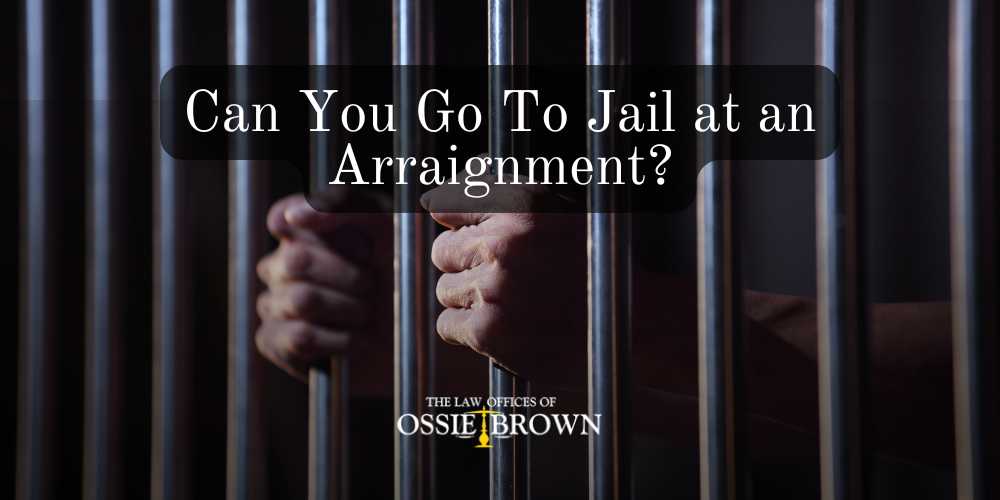Our experienced criminal defense attorneys in Baton Rouge are often asked, “Can you go to jail at an arraignment in Louisiana?” For those with felony or misdemeanor cases, this can seem like a lengthy process. Our Baton Rouge criminal defense attorneys explain what happens at arraignments and what the arraignment process entails.
If your court date is approaching, having an experienced criminal defense attorney is crucial in criminal cases, especially felony cases, where the stakes are high. Unlike a court-appointed attorney, who is a public defender who handles numerous cases at once, a dedicated lawyer provides personalized attention and expertise to build a strong defense.
If you’ve been accused or are facing criminal charges, call 225-343-1111 to schedule a free consultation with an experienced attorney from The Law Offices of Ossie Brown.
What is an Arraignment?
An arraignment is the first court appearance in the criminal process, where a criminal defendant is informed of the formal charges against them. Since the arraignment is the first court date, the judge ensures the defendant understands their constitutional rights and asks them to plead guilty, not guilty, or stand mute.
On the arraignment date, the judge may address bail decisions and set or deny bail based on factors such as the defendant’s criminal history, flight risk, and aggravating factors.
For felony cases or misdemeanor cases, the arraignment may also involve setting future court dates for preliminary hearings or jury trials.
An experienced attorney is essential during the arraignment process to negotiate a plea bargain and provide legal representation. Failing to appear or misunderstanding the serious consequences of this proceeding can result in jail time or other penalties.
Preliminary Hearing vs Arraignment Hearing in Louisiana
In Louisiana, the arraignment and preliminary hearing serve different purposes in the criminal process.
The arraignment is the first court appearance, where defendants are informed of the formal charges against them, their rights, and must enter a guilty or not guilty plea, or no contest plea.
For misdemeanor charges, most defendants will resolve their misdemeanor cases during misdemeanor arraignments, while felony charges proceed to the next steps of court proceedings. On the arraignment date, either the judge sets bail, typically for those with no criminal histories, strong community ties, and other factors influencing the criminal case, denies the bail if the defendant must remain in jail, or releases the defendant on their own recognizance.
This is also when a court-appointed attorney or public defender can be assigned if the defendant cannot afford legal counsel.
The preliminary hearing, on the other hand, is held in felony cases where the court determines if there is enough probable cause to proceed to trial. The judge makes this decision after the prosecution presents evidence and witnesses, which the defendant’s attorney can cross-examine. Unlike the arraignment process, this hearing is focused on establishing whether the criminal case should move forward, not on resolving guilt or innocence.
For those facing criminal charges, having an experienced legal team is critical at both stages to challenge the evidence and potentially negotiate a plea bargain or other favorable outcome.
What Happens at an Arraignment Hearing in Louisiana?
Dedicated lawyers or court-appointed attorneys typically attend arraignment court proceedings with their clients. Felony and misdemeanor arraignments typically involve these steps:
The Defendant Is Read Their Criminal Charges
The arraignment begins with the reading of misdemeanor or felony charges. The judge formally presents the accusations to the defendant, ensuring they are aware of the specific laws they are alleged to have violated.
Bail Decisions and Bond Conditions
During an arraignment, the judge sets bail or denies bail, considering factors like criminal history, flight risk, strong community ties, and aggravating factors. In some instances, the judge may release the defendant on personal recognizance if their ties to the community are sufficient.
Bail allows the defendant to remain out of jail while awaiting future court dates, such as preliminary examinations or trials. If the defendant cannot post bail amounts, they may face jail time as the case proceeds.
The judge may also impose bond conditions, such as travel restrictions, mandatory check-ins, or avoiding contact with certain individuals. This ensures the defendant complies with the law while released on bail or their own recognizance.
An experienced defense lawyer works to ensure bail amounts are reasonable, while a bail bondsman can help defendants post bail if needed. The bail process answers the question, “Can you go to jail at an arraignment in Louisiana?”—it depends on whether bail is grantedand whether the defendant or a bail bondsman will post bail.
The Defendant Enters a Guilty or Not Guilty Plea
At an arraignment, the defendant must enter a plea in response to the criminal charges they are facing. The judge will formally ask the defendant to plead guilty or not guilty or enter a no-contest plea.
This sets the stage for future court appearences in the criminal proceedings, whether for preliminary examinations, plea bargains, or preparing for a jury trial. The decision to plead guilty or admitting guilt has serious reprocussions, including the potential for jail time or continued representation to fight the misdemeanor or felony charges.
The Judge Explains The Next Steps in the Legal Process
After the arraignment, where the defendant enters a guilty or not guilty plea, or no contest plea, the judge explains the next steps in the court proceedings. This includes setting future court dates for pre-trial motions, hearings, or a trial. The judge also handles bail conditions or release terms and outlines any obligations the defendant must meet before their future court appearance.
What Happens At An Arraignment for a Felony in Louisiana?
In Louisiana, misdemeanor arraignments are simpler, focusing on the defendant’s plea and future court appearances, while felony arraignments involve felony charges and additional steps, such as a probable cause conference or preliminary court hearing to assess evidence. The judge may address bond or bail amounts or decisions, set conditions for release, or schedule a probable cause conference for felony cases.
Can You Go To Jail at an Arraignment Hearing in Louisiana?
Answering, “Can you go to jail at an arraignment hearing in Louisiana” is complicated.
To answer whether or not a defendant will go to jail at an arraignment in Louisiana, while the arraignment itself is not a sentencing hearing, certain circumstances during or immediately after the arraignment could cause the defendant to go to jail at an arraignment:
- the defendant is denied bail because of flight risk, they could go to jail at the arraignment.
- the defendant cannot post bail or secure assistance from a bondsman for the required bail amount.
- The defendant violates bond conditions from a previous release.
- The defendant enters a plea of guilt to certain charges, and the judge sets immediate jail time.
A defendant being forced to go to jail at an arraignment without bail considerations or a guilty plea is not typical. If you’re worried you may go to jail at any stage of the court hearing, consider hiring a respected criminal defense lawyer in Baton Rouge. Dedicated lawyers have lighter criminal caseloads than court-appointed attorneys and will ensure clients aren’t admitting guilt without truly understanding the consequences of this.
Can Charges Be Dropped at An Arraignment Hearing in Louisiana?
Yes, charges can be dropped at an arraignment in Louisiana, but this outcome is rare and depends on the specifics of felony or misdemeanor cases.
A private defense lawyer can aggressively negotiate with the prosecutor to dismiss charges before or during the arraignment, often using evidence to challenge probable cause or identify weaknesses in the criminal complaint. In contrast, a public defender, while experienced, may have limited time and resources to explore pre-hearing dismissal opportunities due to a high caseload.
What Happens After Arraignment in Louisiana?
After the arraignment, the process moves to the next phase based on the defendant’s plea. If the defendant enters a plea for innocence, the judge schedules the next court date.
For felonies, preliminary court proceedings may be held to determine if sufficient evidence exists to proceed to trial, while misdemeanor cases often move directly to trial preparation or plea deal negotiations. The judge may also modify bail or address conditions.
Alternatives to Jail After an Arraignment in Louisiana
Not all outcomes of an arraignment require the defendant to go to jail. The judge may consider several alternatives in misdemeanor cases or felony cases:
- probation
- house arrest
- completing programs or educational courses
- restitution.
When Do You Need an Experienced Criminal Defense Attorney Before Arraignment?
Hiring a private lawyer before arraignment is essential, as they provide immediate attention and strategic planning that court-appointed attorneys may not be able to offer before your arraignment date:
Violent Crimes
Private violent crime lawyers in Baton Rouge can interview witnesses, gather evidence, and prepare motions before the first appearance, which court-appointed attorneys may not be able to prioritize.
Sex Crimes
The early involvement of a respected sex crimes lawyer in Baton Rouge ensures the protection of your reputation and rights, offering a level of discretion and preparation that is often missing with appointed defenders.
White-Collar Crimes
For complex fraud or embezzlement cases, private white-collar crime lawyers in Baton Rouge can review financial records and prepare evidence to challenge charges early, while court-appointed attorneys may lack the resources for such preparation.
DUI Charges
Private attorneys can offer proactive defenses by addressing license suspensions, questioning sobriety test results, and preparing for bail decisions. If you’ve been charged with a DUI in Baton Rouge, contact a criminal defense lawyer from our legal team for a free consultation.
Drug Crimes
Early intervention by a private attorney if you’re facing drug possession charges in Baton Rouge, drug distribution charges in Baton Rouge, or even drug trafficking charges in Baton Rouge ensures search and seizure violations are identified, and motions to suppress evidence are filed promptly, which court-appointed attorneys may not always prioritize.
Domestic Violence Charges
A private domestic violence lawyer in Baton Rouge can address restraining orders and build a defense immediately, ensuring that pre-trial conditions are fair, something court-appointed lawyers often cannot do beforehand.
Weapons Charges
Private weapon crime or gun crime lawyers in Baton Rouge can argue for fair bond conditions or dismissal of charges based on the case, providing critical representation that court-appointed attorneys may not be able to offer beforehand.
By hiring a private lawyer before arraignment, you gain an advocate who can immediately address bail decisions, gather evidence, and influence the direction of your criminal case, offering a distinct advantage over court-appointed attorneys in high-stakes situations. Call 225-343-1111 for a free consultation.





